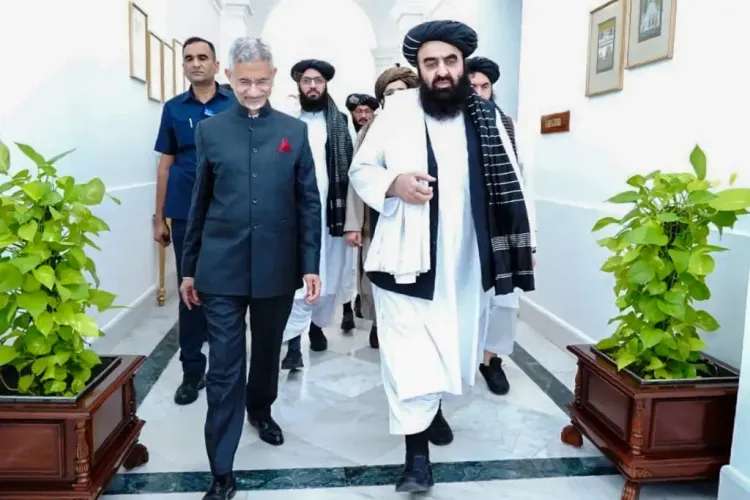Why is the Taliban Expanding Its Diplomatic Outreach After the Foreign Minister’s Visit to India?

Synopsis
Key Takeaways
- The Taliban is diversifying its diplomatic outreach to reduce dependency on single nations.
- Strengthening relations with China and Russia aims to secure economic investments.
- India's historical ties could lead to resumed collaboration on infrastructure projects.
- The geopolitical landscape remains complex, with ongoing concerns about regional stability.
- Afghanistan's mineral resources are attracting significant interest from global powers.
New Delhi, Oct 17 (NationPress) The diplomatic shift by Pakistan regarding a group it once nurtured on its land and supported during two regimes in Kabul, alongside increasing tensions along its border with Afghanistan, has encouraged the Taliban leadership to explore new alliances for their struggling nation. Soon after Afghanistan’s Foreign Minister Amir Khan Muttaqi’s engagements with diplomatic and business sectors in India, his associates have intensified their outreach towards China and Russia as well.
This week, Deputy Prime Minister for Economic Affairs, Mullah Abdul Ghani Beradar Akhund, welcomed representatives from various Russian firms keen on investing in the energy and mining industries.
Meanwhile, Deputy Foreign Minister for Finance and Administration Mohammad Naeem met with Chinese Ambassador to Kabul, Zhao Xing, to enhance bilateral ties.
Interestingly, Russia is the sole country that has officially recognized Afghanistan’s rulers, while China maintains a diplomatic mission in Kabul and hosts the Taliban’s representative in Beijing, although it has not yet granted formal recognition to the government.
The Russian delegation expressed a “strong interest” in investing in critical sectors, including oil extraction, copper and chromite mining, water management, electricity production, and technical machinery manufacturing, as stated by the Deputy PM for Economic Affairs on Thursday.
These companies, as reported by the Kabul Times, plan to establish a permanent office in Kabul for swift coordination with relevant Afghan government departments.
In the meantime, after meeting with Ambassador Zhao, Deputy Minister Naeem issued a statement acknowledging Beijing’s “continued support”.
China’s envoy reiterated that issues should be resolved through dialogue and mutual understanding, rather than conflict, according to a separate report.
Afghanistan remains a pivotal geopolitical point in Central and South Asia, attracting significant interest from neighboring powers.
Since the Taliban regained power in 2021, the nation has experienced profound changes in governance, diplomacy, and regional collaborations.
This year's swift developments highlight how Moscow, New Delhi, and Beijing are adjusting their strategies towards Afghanistan, seeking influence while navigating the complexities of Taliban governance, regional instability, and global shifts.
Russia’s involvement with Afghanistan combines economic aspirations with strategic caution. However, Moscow is cautious of extremist spillover into Central Asia, as the international community remains wary of the Taliban’s true position on transnational terror organizations like ISIS-K and Al Qaeda.
Nonetheless, Kabul has reiterated its commitment to distance itself from these terror groups, claiming to uphold its promise of preventing such organizations from operating on its territory.
Russia also aims to counter Western influence and affirm its relevance in Eurasian matters. The Kremlin views Afghanistan as a crucial link to strengthen ties with Pakistan and Iran, both essential players in its anti-Western coalition.
China’s interest in Afghanistan is anchored in its Belt and Road Initiative (BRI), regional security, and mineral acquisition.
Beijing is particularly interested in Afghanistan’s extensive lithium reserves, vital for its electric vehicle and battery sectors. Infrastructure projects, including railways and roads, are being proposed to integrate Afghanistan into the BRI.
China also seeks cooperation from Kabul as a security buffer, particularly concerning Uyghur separatists allegedly operating in Afghanistan. Beijing is urging the Taliban to take action against the Uyghurs’ East Turkestan Islamic Movement (ETIM), which is labeled a terrorist organization by China.
India’s historical relationship with Afghanistan has been warm, albeit frozen during the Taliban's first regime. New Delhi has maintained communication during the Taliban's second rule without officially recognizing the government. Given India’s investment exceeding $3 billion in Afghan infrastructure, including the Salma Dam and the Afghan Parliament building, Kabul is keen to encourage New Delhi to resume work promptly.
India has quickly sent medical supplies and relief materials in response to natural disasters in Afghanistan. With the renewal of discussions and growing mutual trust, India may consider avenues for limited trade.
The Taliban is strategically leveraging these competing interests to secure economic support and political legitimacy.
By engaging with all three nations, Kabul aims to diversify its partnerships and minimize reliance on any single entity.









